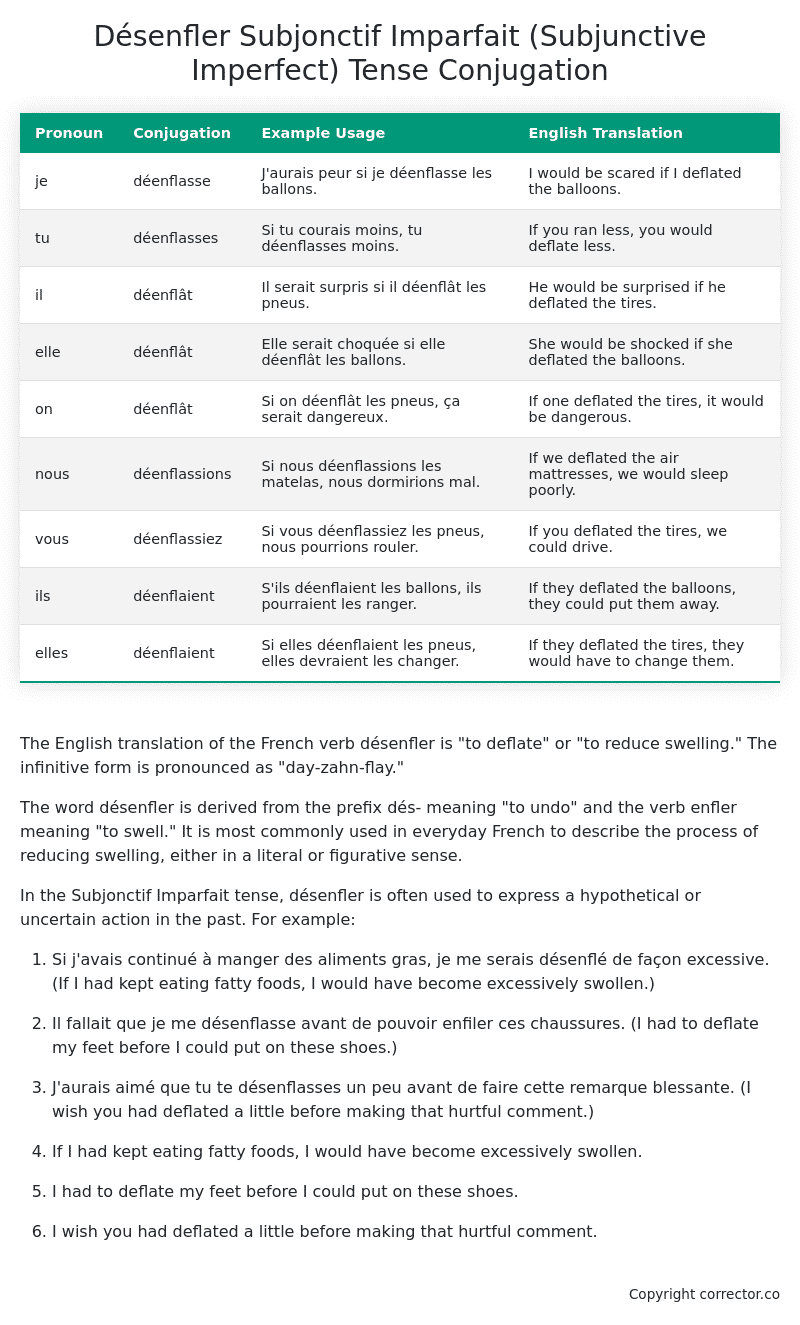Subjonctif Imparfait (Subjunctive Imperfect) Tense Conjugation of the French Verb désenfler
Introduction to the verb désenfler
The English translation of the French verb désenfler is “to deflate” or “to reduce swelling.” The infinitive form is pronounced as “day-zahn-flay.”
The word désenfler is derived from the prefix dés- meaning “to undo” and the verb enfler meaning “to swell.” It is most commonly used in everyday French to describe the process of reducing swelling, either in a literal or figurative sense.
In the Subjonctif Imparfait tense, désenfler is often used to express a hypothetical or uncertain action in the past. For example:
-
Si j’avais continué à manger des aliments gras, je me serais désenflé de façon excessive. (If I had kept eating fatty foods, I would have become excessively swollen.)
-
Il fallait que je me désenflasse avant de pouvoir enfiler ces chaussures. (I had to deflate my feet before I could put on these shoes.)
-
J’aurais aimé que tu te désenflasses un peu avant de faire cette remarque blessante. (I wish you had deflated a little before making that hurtful comment.)
-
If I had kept eating fatty foods, I would have become excessively swollen.
-
I had to deflate my feet before I could put on these shoes.
-
I wish you had deflated a little before making that hurtful comment.
Table of the Subjonctif Imparfait (Subjunctive Imperfect) Tense Conjugation of désenfler
| Pronoun | Conjugation | Example Usage | English Translation |
|---|---|---|---|
| je | déenflasse | J’aurais peur si je déenflasse les ballons. | I would be scared if I deflated the balloons. |
| tu | déenflasses | Si tu courais moins, tu déenflasses moins. | If you ran less, you would deflate less. |
| il | déenflât | Il serait surpris si il déenflât les pneus. | He would be surprised if he deflated the tires. |
| elle | déenflât | Elle serait choquée si elle déenflât les ballons. | She would be shocked if she deflated the balloons. |
| on | déenflât | Si on déenflât les pneus, ça serait dangereux. | If one deflated the tires, it would be dangerous. |
| nous | déenflassions | Si nous déenflassions les matelas, nous dormirions mal. | If we deflated the air mattresses, we would sleep poorly. |
| vous | déenflassiez | Si vous déenflassiez les pneus, nous pourrions rouler. | If you deflated the tires, we could drive. |
| ils | déenflaient | S’ils déenflaient les ballons, ils pourraient les ranger. | If they deflated the balloons, they could put them away. |
| elles | déenflaient | Si elles déenflaient les pneus, elles devraient les changer. | If they deflated the tires, they would have to change them. |
Other Conjugations for Désenfler.
Le Present (Present Tense) Conjugation of the French Verb désenfler
Imparfait (Imperfect) Tense Conjugation of the French Verb désenfler
Passé Simple (Simple Past) Tense Conjugation of the French Verb désenfler
Passé Composé (Present Perfect) Tense Conjugation of the French Verb désenfler
Futur Simple (Simple Future) Tense Conjugation of the French Verb désenfler
Futur Proche (Near Future) Tense Conjugation of the French Verb désenfler
Plus-que-parfait (Pluperfect) Tense Conjugation of the French Verb désenfler
Passé Antérieur (Past Anterior) Tense Conjugation of the French Verb désenfler
Futur Antérieur (Future Anterior) Tense Conjugation of the French Verb désenfler
Subjonctif Présent (Subjunctive Present) Tense Conjugation of the French Verb désenfler
Subjonctif Passé (Subjunctive Past) Tense Conjugation of the French Verb désenfler
Subjonctif Imparfait (Subjunctive Imperfect) Tense Conjugation of the French Verb désenfler (this article)
Subjonctif Plus-que-parfait (Subjunctive Pluperfect) Tense Conjugation of the French Verb désenfler
Conditionnel Présent (Conditional Present) Tense Conjugation of the French Verb désenfler
Conditionnel Passé (Conditional Past) Tense Conjugation of the French Verb désenfler
L’impératif Présent (Imperative Present) Tense Conjugation of the French Verb désenfler
L’infinitif Présent (Infinitive Present) Tense Conjugation of the French Verb désenfler
Struggling with French verbs or the language in general? Why not use our free French Grammar Checker – no registration required!
Get a FREE Download Study Sheet of this Conjugation 🔥
Simply right click the image below, click “save image” and get your free reference for the désenfler Subjonctif Imparfait tense conjugation!

Désenfler – About the French Subjonctif Imparfait (Subjunctive Imperfect) Tense
Formation
Common Everyday Usage Patterns
Interactions with Other Tenses
Subjonctif Présent
Indicatif Passé Composé
Conditional
Conditional Perfect
Summary
I hope you enjoyed this article on the verb désenfler. Still in a learning mood? Check out another TOTALLY random French verb conjugation!


